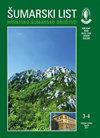Phytotoxicity of clopyralid at high rates on seed germination of mediterranean pines
IF 0.4
4区 农林科学
Q4 FORESTRY
引用次数: 0
Abstract
Black pine (Pinus nigra J. F. Arnold), maritime pine (P. pinaster Aiton), Scots pine (P. sylvestris L.), and Turkish red pine (TRP, P. brutia Ten.) are ecologically and economically important conifers of the Mediterranean Basin, and in particular for Turkish forestry. They are commonly used for the regeneration and restoration of degraded ecosystems in Turkey. Weeds compete with tree seedlings for vital site elements such as soil moisture and nutrients and solar radiation, substantially reducing tree establishment and growth. Herbicides can offer the practitioner efficient and cost-effective weed control compared to other methods. Rapid herbicide seed screening allows testing of crop-safe herbicides and application rates at much lower costs in a very short time-frame when compared to lengthy field trials. Clopyralid is a systemic herbicide used to rid pine seedlings of competing vegetation. The present study examined the effect of clopyralid phytotoxicity on these pine species using a rapid herbicide seed screening test in order to compare different application rates on seed germination and to identify crop-safe rates. Clopyralid was not phytotoxic to any of the pine species at low rates (i.e., <2%, v:v); however, pine sensitivity to the herbicide increased with increasing rates, especially for rates higher than 3%. Moreover, at high rates, clopyralid reduced the germination speed. This herbicide can be used at low rates for degraded areas and nursery sites in which sowing is used as the main regeneration or restoration method. Field confirmation of the obtained results is also recommended.高速率氯吡酯对地中海松树种子萌发的植物毒性
黑松(Pinus nigra J. F. Arnold)、海松(P. pinaster Aiton)、苏格兰松(P. sylvestris L.)和土耳其红松(TRP, P. brutia Ten.)是地中海盆地生态和经济上重要的针叶树,对土耳其林业尤其重要。它们通常用于土耳其退化生态系统的再生和恢复。杂草与树苗竞争重要的场地元素,如土壤水分和养分以及太阳辐射,大大减少了树木的建立和生长。与其他方法相比,除草剂可以为从业者提供有效和经济的杂草控制。与漫长的田间试验相比,快速除草剂种子筛选可以在很短的时间内以更低的成本测试作物安全除草剂和施用量。氯吡唑啉是一种系统除草剂,用于清除松树幼苗的竞争植被。为了比较不同施用量对种子萌发的影响,确定作物安全施用量,本研究采用快速除草剂种子筛选试验研究了氯吡酯对这些松树的植物毒性影响。在低浓度(即<2%,v:v)时,氯吡唑啉对任何一种松树都没有植物毒性;然而,松木对除草剂的敏感性随施用量的增加而增加,特别是施用量大于3%时。此外,在高速率下,氯吡啉降低了发芽速度。该除草剂可用于以播种为主要再生或恢复方法的退化地区和苗圃。还建议对获得的结果进行现场确认。
本文章由计算机程序翻译,如有差异,请以英文原文为准。
求助全文
约1分钟内获得全文
求助全文
来源期刊

Sumarski List
FORESTRY-
CiteScore
0.90
自引率
20.00%
发文量
32
审稿时长
>12 weeks
期刊介绍:
Forestry Journal publishes scientific and specialist articles from the fields of forestry, forestry-related scientific branches, nature protection and wildlife management.
 求助内容:
求助内容: 应助结果提醒方式:
应助结果提醒方式:


